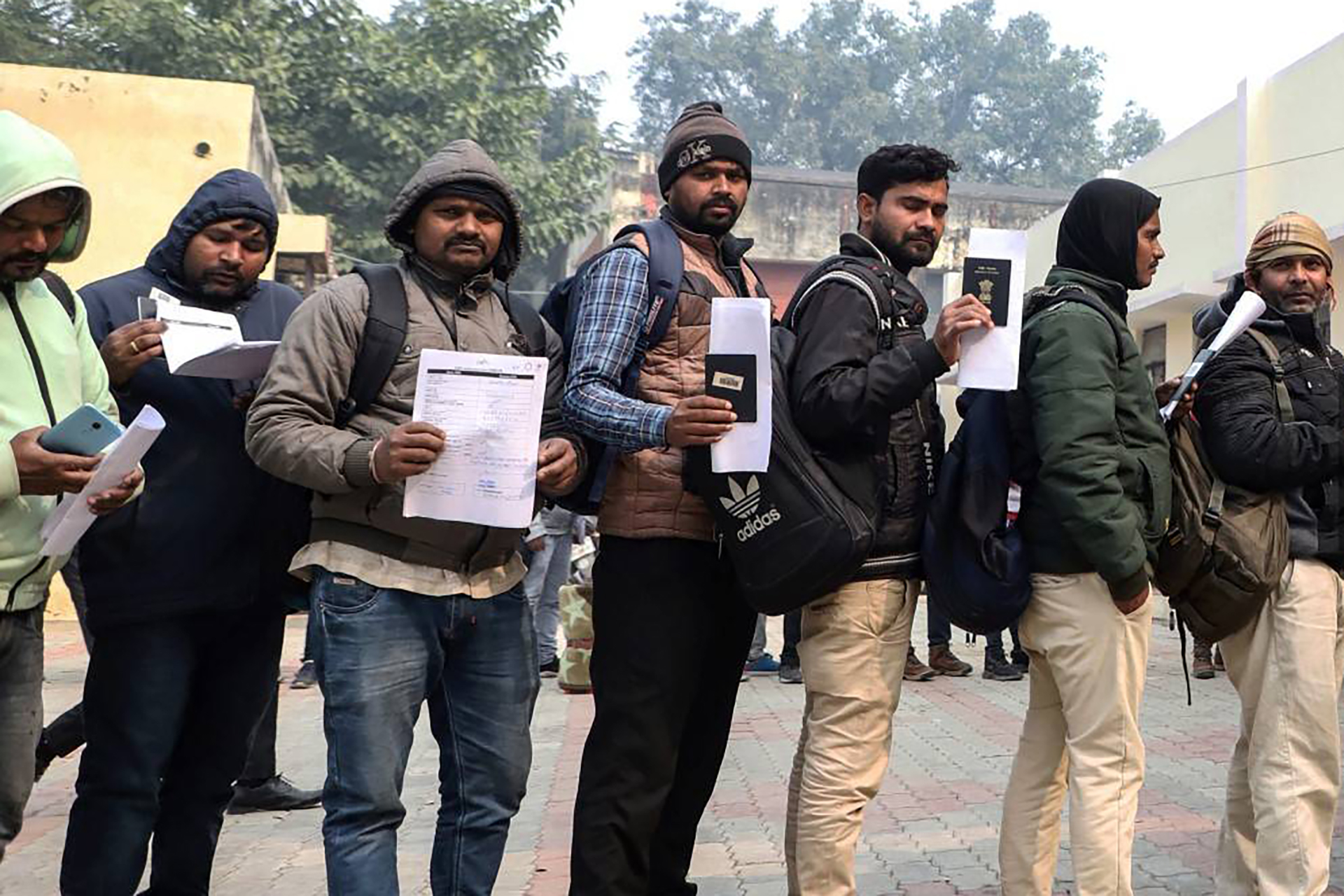Indian workers wait for their turn to apply for a work visa in Israel (French)
Currently, millions of Indians dream of obtaining a work visa in Israel thanks to the close alliance between their Prime Minister Narendra Modi and Israeli Prime Minister Benjamin Netanyahu, but at the expense of daily sustenance for tens of thousands of Palestinian workers who were expelled by Israel from the labor market.
This aspect was addressed by the Hebrew newspaper Haaretz in a new, lengthy investigation.
In front of Maharshi Dayanand University in Harina state, west of New Delhi, construction worker Vinod Dangi (41 years old) is waiting his turn to undergo a skill test.
Despite the bitter cold, hundreds of people between the ages of 24 and 46 lined up in long lines, waving their CVs, all hoping to win a work visa in Israel.
Israel banned the entry of 100,000 Palestinian workers following the Al-Aqsa flood operation last October 7.
To compensate for the gap, it began importing labor mainly from India, China and a few other countries.
Thanks to the close alliance between Netanyahu and the Modi government, there was an agreement to facilitate the employment of Indians.
Israeli Transport Minister Miri Regev said on the X platform from India last week that Israel wants to reduce its dependence on Palestinian labor.
A month earlier, Netanyahu urged his Indian counterpart to implement the 2023 agreement, which facilitates the employment of 40,000 Indians in the construction and nursing sectors.
The occupation authorities prevented 100,000 Palestinian workers from entering the settlements and occupied territories (Reuters)
Advertising campaign
After a call between Netanyahu and Modi last December, two Indian states, Haryana and Uttar Pradesh, announced the opening of 10,000 jobs for carpenters, builders, and university graduates with experience in their specialty ranging between 3 and 5 years.
The recruitment drive was widely promoted on pro-government channels, many of which spoke of the helping hand India should extend to the Israeli ally.
The recruitment drive included other states and was sometimes accompanied by a statement that Muslim Indians should not bother applying for advertised positions, meaning they would be excluded.
The Chargé d'Affaires of the Indian Embassy in Tel Aviv confirmed that "all candidates can apply for the job. He said: "Israelis supervise the tests in India and select candidates based on skill tests."
But from his place in line in front of Maharshi Dayanand University, Dingee told Haaretz, "All the workers know that Muslims will not get work visas."
Wars and markets
“Why would we leave for a country at war if we were given a job here? We are taking huge risks,” says a carpenter in line, Narendra Kumar.
But the risk is worth it because it will turn them into real rich people.
By Indian standards, of course, Fandji - who lives on a salary of no more than $360, barely enough to support his wife, three children and father - has been dreaming of a job in Israel for years.
His wife, Mina, says that if they get the job, they will be able to plan their daughter’s marriage, and perhaps buy a house.
Annually, tens of thousands of Indians migrate to Europe to improve their economic situation.
Many of them have no education, skills or even training.
Wars in recent years have provided work opportunities abroad for many Indians.
Among them is the war on Gaza and before that the Ukrainian war, where Russia announced a plan to import foreign labor, but at salaries lower than Israel’s.
It is expected that the first Indian workers will arrive in Israel soon in groups ranging from 700 to 1,000 individuals.
Opposing voices
There is no consensus in India on the issue, as a member of the upper chamber of Parliament, Jairam Ramesh, says, “Doesn’t the initiative trivialize the claim that our economy is prosperous and opens the door to employment for people?”
Unions rejected this plan, with All India Trade Union Congress General Secretary Amarjeet Kaur saying: “We will not allow our workers to be sent to war zones.”
Unions also fear the exploitation of migrant workers in Israel due to what they describe as a hasty recruitment process that ignores the necessary protection measures, accusations that were dismissed by Foreign Minister Randhir Jaiswal, who stressed the “strictness of Israeli labor laws.”
There are also relatively low safety standards in Israel, especially in the construction sector, where they are two to 2.5 times lower than in the European Union, according to an Israeli organization concerned with defending vulnerable workers, not to mention that labor inspectors only visit construction sites once every three years to verify these standards. .
As for the opposition National Congress Party, it considered this agreement an investment in the tragedy of the Palestinian people. Party leader and former minister Mani Shankar Aiyar told Al Jazeera, “Israel is committing a war of genocide in the Gaza Strip, and this is the worst way to make money.”
Source: Israeli press

